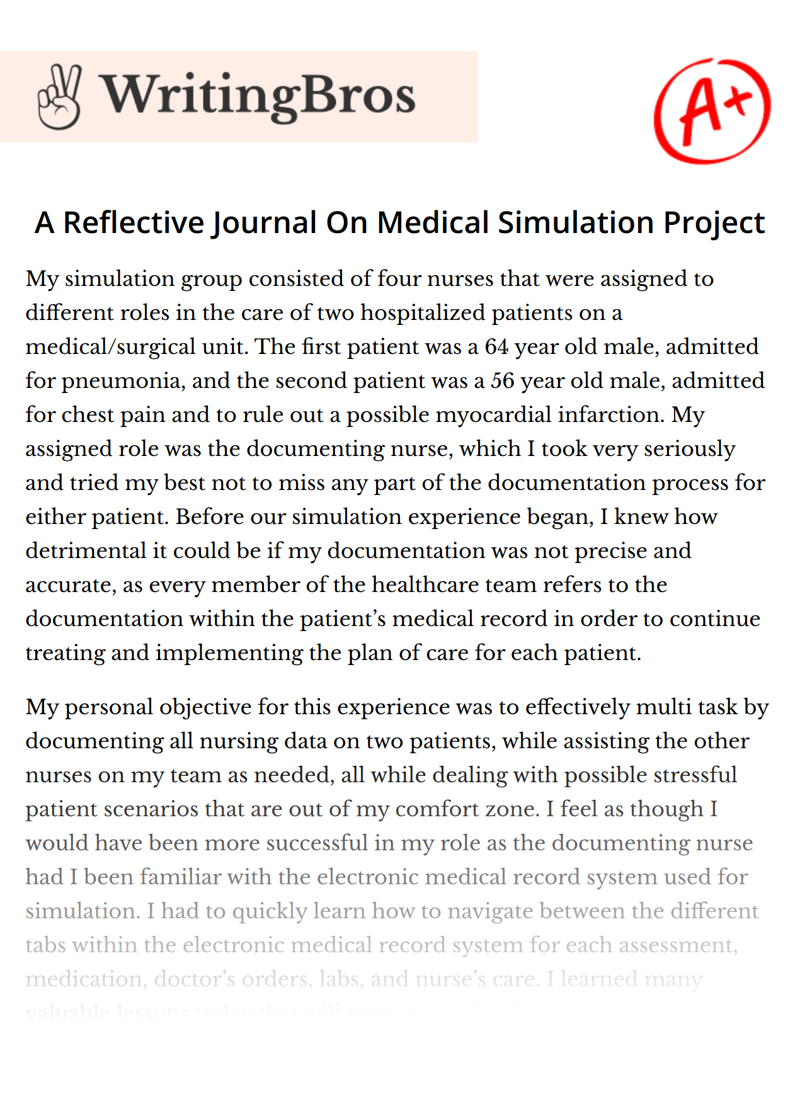A Reflective Journal On Medical Simulation Project

My simulation group consisted of four nurses that were assigned to different roles in the care of two hospitalized patients on a medical/surgical unit. The first patient was a 64 year old male, admitted for pneumonia, and the second patient was a 56 year old male, admitted for chest pain and to rule out a possible myocardial infarction. My assigned role was the documenting nurse, which I took very seriously and tried my best not to miss any part of the documentation process for either patient. Before our simulation experience began, I knew how detrimental it could be if my documentation was not precise and accurate, as every member of the healthcare team refers to the documentation within the patient’s medical record in order to continue treating and implementing the plan of care for each patient.
My personal objective for this experience was to effectively multi task by documenting all nursing data on two patients, while assisting the other nurses on my team as needed, all while dealing with possible stressful patient scenarios that are out of my comfort zone. I feel as though I would have been more successful in my role as the documenting nurse had I been familiar with the electronic medical record system used for simulation. I had to quickly learn how to navigate between the different tabs within the electronic medical record system for each assessment, medication, doctor’s orders, labs, and nurse’s care. I learned many valuable lessons today that will prepare me for future patient encounters.
While observing my classmates work through their simulation experience, a medication error occurred, which was eye opening for me. It made me realize how important it is to implement the rights of medication administration before administering, and how crucial it is to be familiar with medications, correct dosages, and potential side effects. I became aware that occasionally, doctors do make mistakes when placing medication orders, and it made me remember the saying “if in doubt, check it out!” that I learned from a previous nursing professor. Medication errors can be prevented if we just take a few minutes to look up the medications we are unfamiliar with. Patient safety is most important!
Towards the end of my simulation shift, one of the patient’s coded, and the start of CPR was delayed due to my team and I not paying closer attention to the patient’s status and the telemetry monitor that the patient was connected to. I feel as though that stressful scenario had a significant impact on me and made me aware of what I need to focus on for the next simulation experience. I plan on improving my critical thinking skills and being more observant to my surroundings in order to be more successful in my assigned role.
Today’s simulation experience helped me to identify abnormal assessment findings, prioritize nursing interventions, and practice effective communication skills among my team. I gained new insights of better practices for handling difficult situations that will hopefully give me confidence and help me to feel better prepared for the next simulation experience.
Cite this Essay
To export a reference to this article please select a referencing style below

